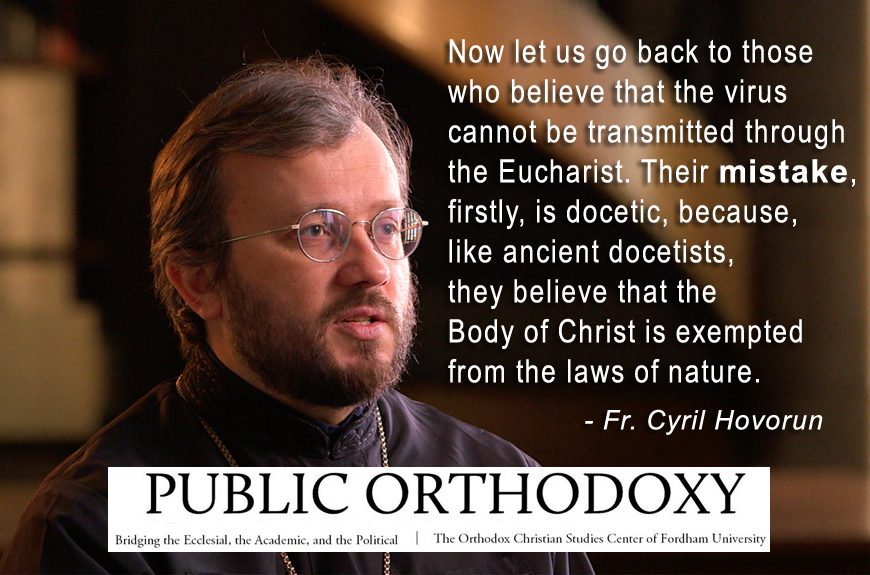 Here comes “Public Orthodoxy” with yet another challenge to the true teaching of the Orthodox Church by Fr. Cyril Hovorun, a progressive academic who appears enamored with the spirit of the world. Hovorun fancies himself wiser than the Apostles, Saints, Fathers, Theologians, and Teachers of the Church. ANAXIOS!
Here comes “Public Orthodoxy” with yet another challenge to the true teaching of the Orthodox Church by Fr. Cyril Hovorun, a progressive academic who appears enamored with the spirit of the world. Hovorun fancies himself wiser than the Apostles, Saints, Fathers, Theologians, and Teachers of the Church. ANAXIOS!
The heretical academics at “Public Orthodoxy” just can’t let a serious crisis go to waste.
Key excerpts by Fr. Cyril Hovorun:
“Now let us go back to those who believe that the virus cannot be transmitted through the Eucharist. Their mistake, firstly, is docetic, because, like ancient docetists, they believe that the Body of Christ is exempted from the laws of nature. A docetist text from the Nag Hammadi collection stated about the body of Christ: “Jesus… ate and drank in a special way, without excreting his solids. He had such a great capacity for continence that the nourishment within him was not corrupted, for he did not experience corruption.” (Valentinus, fr. 3).”
…
Secondly, those who think so about the Eucharistic Body, fall into the mistake of Manichaeism. Manichaeism was a dualistic doctrine that divided the physical world into good and evil parts. A Manichaean psalm survived in Coptic in the Medinet Madi codex, states: “When the Holy Spirit came he revealed to us the way of truth and taught us that there are two natures, that of light and that of darkness, separate one from the other from the beginning” (Ps. 223).” ~ Fr. Cyril Hovorun
Listed below is the link to the article full of false premises and heretical teaching.
COVID-19 and Christian (?) Dualism
https://publicorthodoxy.org/2020/03/23/covid-19-and-dualism/
————————————
UPDATE:
It gets even worse. One of our blog readers, another Orthodox priest, pointed out that Fr. Hovorun on March 12, 2020, in a post on his Facebook page publicly denounced the Orthodox Church teaching on the Holy Eucharist as “deceitful, irresponsible, and criminal.” Fr. Hovorun wrote this (translated, key words and phrases were bolded for emphasis) :
Yes, the virus can be transmitted through a common communion cup. To think otherwise is a docetic attitude towards the gifts. Everyone who comes to the chalice must be aware of it, and make a decision: to receive or not, based on this understanding.
To deceive people and themselves, by invoking faith, promising that nothing will happen, is theologically wrong, as well as irresponsible, and may even be criminal.
For example, I am well aware of this and, nevertheless, I consume the gifts after each and everyone.
What is the alternative to not communing at all? It is possible, for example, to give the gifts to everyone in the hands — as is customary for us with deacons. This does not completely eliminate, but minimizes the risk of infection.
By the way, the Catholics here have moved from the practice of putting a wafer in everyone’s mouth, to practice putting it in their hands.
So far that Facebook post was liked by 424 individuals and shared 102 times.
NOTE: We used portions of a translation of Fr. Hovorun’s comments available from this article: Coronavirus and the Chalice: Can you get sick, or not? in addition to Google and Facebook translate, in order to insure the accuracy of his comments.
————————————
UPDATE #2:
Another reader mentioned that progressive academic George Demacopoulos (who manages the “Public Orthodoxy” website together with Aristotle Papanikolaou, also a progressive academic) posted this endorsement on his Facebook page:
According to Fr. Cyril Hovorun, the assertion that the eucharist cannot transmit disease is, in fact, a repetition of ancient heresies (namely Docetism and Manicheanism) because the assertion doesn’t take into account what one is implying about God as Creator or Christ as human.
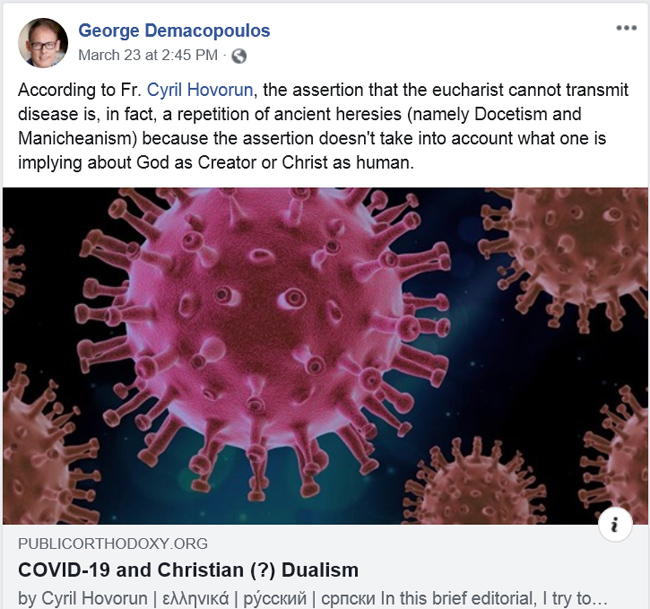
How much longer will this blasphemy and open rebellion inside the Church be tolerated by the bishops?


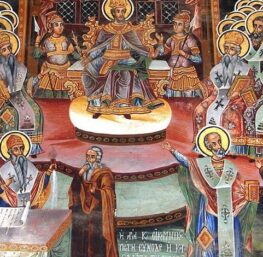
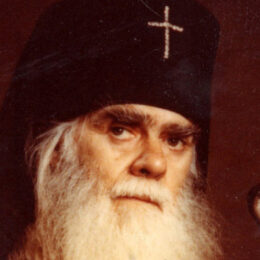
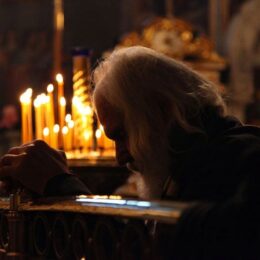
Fr. Cyril is right. Those Orthodox who hold to a Docetic understanding of the Eucharist – and as Fr. Alexander Schmemann said in his famous book “For the Life of the World” most Orthodox in fact hold to one version or another of Transubstantiation (which is docetic to the core) – would do well in trying to understand how the Fathers actually did metaphysics and epistemology.
Just as Christ’s human nature is not in conflict or in need of a metaphysical transform – a change into something it is not because it is fundamentally “diseased” or “corrupted” – the bread and wine of the Holy Eucharist does NOT undergo a tran-substantiation when the priest during the liturgy or the Holy Father’s assert that the bread and wine “become” the Body and Blood. Christ real human nature does not “change” when combined with His Divine nature in His Person – on the contrary, his Divinity makes his humanity what it “really” is, its “true end” (telos).
As Fr. Schmanna put it, during the middle ages the great mass of Orthodox believers – including the otherwise educated hierarchy – suffered a “pseudomorphism” and simply accepted (largely unconsciously) the RC doctrines of transubstantiation and nomalistic “symbolism”. The Holy Fathers knew nothing of this – they thought in terms of Realist Symbolism.
While I appreciate this site’s effort to unmask the basic secularism of Public Orthodoxy, your in error to associate this particular point of Fr. Cyril’s with it, whatever his sins in other areas might be…
Christopher Encapera
The entire Church disagrees! It’s not just heresy, it’s also blasphemy.
Patriarch of Romania on coronavirus : The holy Eucharist can never be a source of sickness and death
https://orthochristian.com/128952.html
Metropolitan of Peristeri: Blasphemy to believe that virus can be transmitted by receiving Holy Communion
https://orthodoxtimes.com/metropolitan-of-peristeri-blasphemy-to-believe-that-virus-can-be-transmitted-by-receiving-holy-communion/
No Coronavirus Risk from Holy Communion, says Holy Synod in Greece
http://www.ekathimerini.com/250391/article/ekathimerini/news/no-coronavirus-risk-from-holy-communion-says-holy-synod
Greek Orthodox Church: Coronavirus Not Transmitted Via Holy Communion
https://www.richarddawkins.net/2020/03/greek-orthodox-church-coronavirus-not-transmitted-via-holy-communion/
Church of Cyprus: Blasphemy to even think that Holy Communion can transmit any disease
https://orthodoxtimes.com/church-of-cyprus-it-would-be-blasphemous-to-think-that-christs-body-and-blood-could-transmit-any-disease/
Bulgarian Church Leader Insists Sacraments Cannot Transmit Coronavirus
https://balkaninsight.com/2020/03/11/sofias-metropolitan-prays-away-coronavirus-worries/
Greek Orthodox Church Declares Coronavirus Not Transmitted by Communion
https://greece.greekreporter.com/2020/03/09/greek-orthodox-church-declares-coronavirus-not-transmitted-by-communion/
re: “Fr. Cyril is right.”
No he is wrong. Constantine Shmlyuk explains:
Coronavirus and the Chalice: Can you get sick, or not?
https://orthochristian.com/129587.html
you have no clue what you speak of nor do you have any clue about the theology behind the eucharist.
The body and blood of Christ gives LIFE, it heals, The uncreated divine energies divinized his human body and blood and THAT is why he assumed human nature and how now we partake of the divine nature as saint Peter says. If the ROBE of Christ healed the bleeding woman and His Spit healed the blind man, you better believe His body and blood doesn’t transmit diseases. Repent of your blasphemy!!
Would it be possible to provide some information on how the article is heretical? So far it just seams that you are interested in criticizing the person who wrote the article. I found the article a worthwhile read and would like to know where it strayed from Orthodox teaching.
Here are some resources that explain why in detail.
“No genuinely believing Christian can for one moment accept that the Holy Mysteries might bring or be the source of sickness or ill-health: by no means!” ~ Bishop Irenei of London
An Orthodox Christian Response to the Coronavirus
https://www.orthodoxytoday.org/blog/2020/03/an-orthodox-christian-response-to-the-coronavirus/
Disease and Holy Communion
https://www.oca.org/reflections/fr.-john-breck/disease-and-holy-communion
Holy Communion does not transmit Corona Virus
https://youtu.be/rNy1JaqIC-s
Patriarch of Romania on coronavirus : The holy Eucharist can never be a source of sickness and death
https://orthochristian.com/128952.html
Metropolitan of Peristeri: Blasphemy to believe that virus can be transmitted by receiving Holy Communion
https://orthodoxtimes.com/metropolitan-of-peristeri-blasphemy-to-believe-that-virus-can-be-transmitted-by-receiving-holy-communion/
No Coronavirus Risk from Holy Communion, says Holy Synod in Greece
http://www.ekathimerini.com/250391/article/ekathimerini/news/no-coronavirus-risk-from-holy-communion-says-holy-synod
Greek Orthodox Church: Coronavirus Not Transmitted Via Holy Communion
https://www.richarddawkins.net/2020/03/greek-orthodox-church-coronavirus-not-transmitted-via-holy-communion/
Church of Cyprus: Blasphemy to even think that Holy Communion can transmit any disease
https://orthodoxtimes.com/church-of-cyprus-it-would-be-blasphemous-to-think-that-christs-body-and-blood-could-transmit-any-disease/
Bulgarian Church Leader Insists Sacraments Cannot Transmit Coronavirus
https://balkaninsight.com/2020/03/11/sofias-metropolitan-prays-away-coronavirus-worries/
Greek Orthodox Church Declares Coronavirus Not Transmitted by Communion
https://greece.greekreporter.com/2020/03/09/greek-orthodox-church-declares-coronavirus-not-transmitted-by-communion/
Zane,
You can also read this:
Coronavirus and the Chalice: Can you get sick, or not?
https://orthochristian.com/129587.html
Not only are Fr. Cyril Hovorun’s teachings heretical, they are also blasphemous.
“The Holy Communion is life. It is a miracle. It is a blasphemy to believe that the virus can be transmitted by receiving Holy Communion.” ~ Metropolitan Klimis of Peristeri
Metropolitan of Peristeri: Blasphemy to believe that virus can be transmitted by receiving Holy Communion
https://orthodoxtimes.com/metropolitan-of-peristeri-blasphemy-to-believe-that-virus-can-be-transmitted-by-receiving-holy-communion/
Mr Hovorun
I can not bring myself to call you father. Simply put, you are a faithless fool!
I share your sentiment.
This “priest” is a heretic and should be deposed ASAP
Not only do faithful Orthodox Christian not get sick from receiving Holy Communion from the same cup as hundreds of other faithful each liturgy, but given the many diseases, pandemics, and plagues throughout the centuries, there would be no Orthodox priest, bishop, or deacon left alive since they must consume the rest of the Holy Eucharist after each liturgy!
Science is against you priest… repent and believe.
https://russian-faith.com/news/no-danger-of-disease-from-holy-communion-scientific-studies-say-n2960
Leaving aside the many theological flaws, false premises, and implied blasphemy against the Holy Spirit (what exactly is the priest doing during the Holy Liturgy when he invokes the Holy Spirit to transform the bread and wine into the Holy Eucharist, just pretending?), it’s really simple, ultimately.
Who Do We Trust?
Do we trust the truthful teaching, witness, and authority of Our Lord Jesus Christ, the Holy Spirit, the Apostles, the Saints, The Fathers, the Theologians, and the Teachers of the Church?
OR
Do we trust the “authority” of Fr. Hovorun?
Christ is risen! Maybe you will care to check this link, too:
https://fortheorthodoxeverywhere.com/2020/04/20/contagionthroughcommunion/
Here it is an excerpt:
“We have witnessed the rise of a novel (international) debate regarding the transmission of contagious diseases through communion, the subjacent question being whether the pathogens do survive in the Chalice. As far as we could understand, some defend the “cause” of the pathogens (the fact that it would be more responsible not to go for communion during pandemics being also suggested), other stand for the sterility of the Chalice, whilst the debate makes the believers wonder – do we contract diseases through communion or not, after all? […] But, is a debate conducted under these specific coordinates actually useful? […]
Can we better understand why the stories about those who did not become ill when consuming the Holy Gifts after a contagious person are not the mere product of a pious but untenable tradition? We think the answer to all these questions is yes and we will try to develop the idea in the following. […].
For us, as human beings, it is not relevant or spiritually fruitful to inquire scholastically into what exactly happens with the pathogens that enter in contact with the Holy Eucharist. What is truly important is the significance of not catching diseases through the Holy Communion in the wider context of our struggle for salvation. And it is our view that this fact has a precise and understandable part into this larger picture, namely that it prevents us from stumbling and consequently refraining from taking the Holy Gifts out of fear of contagious diseases.
Just as the Holy Gifts preserve the appearance of bread and wine so that we do not stumble by perceiving their consummation as repugnant, also nobody acquires contagious diseases through communion, in order not to become frightened and stay away from Christ out of fear of contagion. Therefore, irrespective of our being weak, unworthy, vulnerable to disease because of various personal particularities, no one gets sick.”
Mr. Hovorun and his minions are tearing the Holy Orthodox Church to pieces with their blasphemy and heresy. This wolf in sheep’s clothing is doing great damage. But the Lord will use it for good. I see a day when these progressives become uniates. There will be no more grey areas. The gates of hades will not prevail.
I appreciate your stance on Holy Communion.
Unfortunately my priest and Bishop here in South Africa believe all this Covid nonsense.
Won’t even allow people to kiss his hand.
The faithlessness of the Hierarchs upset me quite a bit.